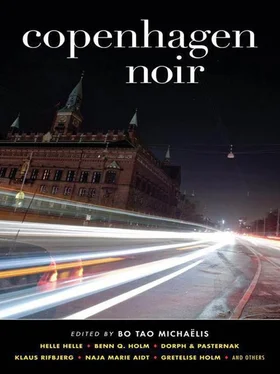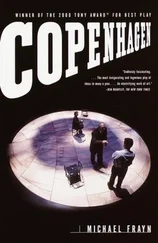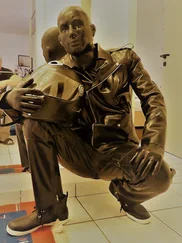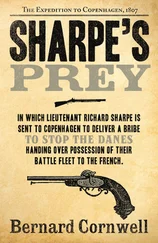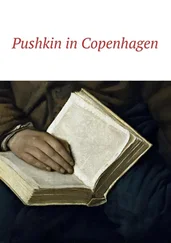The police station down by Slussplan, right by the canal, lies mostly in darkness. It’s that time, right between night and morning, and slowly the city wakes up, revealing all the secrets of the night. Rain mixed with snow falls heavily. The water in the canal reflects the light, traffic lights blink yellow, again and again. Down by Midhem, at one of the many twenty-four hour gas stations, a small fire ignites and spreads quickly along the back wall-a neglected area where trash has accumulated for many years. Three or four homeless people who’ve been using the area as a shelter from the wind run off, leaving the fire behind. They stumble along Lundavägen like evil-smelling ghosts, on their way toward the dense bushes right opposite Hedberg’s car dealership. And then everything is recognizable yet again, from the acrid smell of burned plastic, damp leaves, scraps from a fast food place, a worthless windbreaker. The rancid smell of urine, alcohol, rotting food. Three of the four who run from the fire will not make it through February, the month of the death god. The youngest of them will be found dead in a gateway on Zenithgatan, right next to Rörsjöskolan. Life is in motion, it happens. We have so little to fight back with. We’ve created a world that turns its back on us.
Malmø is Sweden’s third largest city.
The city is growing, in constant motion. The boundaries between Copenhagen and Malmø are growing more and more diffuse with every year that passes. Transportation is fast now-and everything can be transported. Huge sums of money change hands every day. The economy, lust, and desire itself move freely, like underwater currents. You see the ripples on the surface but never the big currents, the big fish.
Stars can just be made out in the grayness; far away a siren is heard from an emergency vehicle. Everything is within everything. Even chaos creates its own pattern, like looking through a kaleidoscope. Down in Rosengård a basement fire starts up. In the last few weeks there have been several, almost always basement fires, lit with rubbing alcohol and matches. The rental agency has emptied all the storage rooms, nothing of value has been left behind, nothing that could be ignited. Which means that they drag the trash in there themselves and light it. Why? The answer is simple: because they can.
A security company makes rounds, drives slowly through the badly designed alleys. They’ve been ordered never to stop, never to leave their car, always to call, “Patrol in danger,” at the least sign of trouble. This of course contributes to aggravating the mood, to the feeling of being out on a dangerous assignment. The divisions become sharper and sharper. The difference between them and us more and more pronounced.
Windows in the stairwells are brightly lit. The city is besieged by its inhabitants, and a ghost walks through the city, a phantom.
Then the fire in the eastern parts of the city gets going. The night worker at Statoil strikes the alarm for the fire department and within a short time the gas station and the fast food restaurant have been shut down for customers. Someone also decides to block off the upper part of Lundavägen. Two big cranes block off the street. A lonely policeman is given the task of directing the scanty traffic. A rain storm is gathering, clouds quickly pile up above the city. This gray, miserable city of no mercy. On this day, in this city.
This morning finds Nils Forsberg sleeping at his kitchen table. A string of saliva has run down his chin. Forsberg doesn’t dream. He’s sunk into a deep black hole-the dreams are happening somewhere else. The alcohol rushes throughout his body, shakes and shivers in all his body’s nooks and crannies, searching for cells, thirsty cells wanting to be saturated again. Time will burn off the alcohol. Time is our only friend. It moves on, rushing like an ocean. Everything tears and jerks inside of him and he can’t see it or understand it. He’s like the living dead, what’s left over at the end. Finally, that’s what it’s all about: time. It changes us, it teaches us, if only we’ll listen.
In the end, it all comes down to one question: who is it you belong to?
Who do you belong to? Your car? Your job? The alcohol? The drugs? You allow yourself to be defeated, vanquished, conquered, beaten. Eventually, that’s the only thing Nils Forsberg can subscribe to: that he’s owned. To live becomes like being on fire for one moment. To flare up like a star in a black room, imploding, then disappearing with a faint hissing sound, like when you drop a burning match into a glass of water. One quick fizzle, then all is quiet.
“Even time is political,” Mats Granberg once said. Forsberg’s answer had been blunt, not to say aggressive. “Ah ha? And what the hell do you want me to do about it?” How do you answer something like that? Which of course only meant that Forsberg tried to make sense of it because he missed his friend. He also knew that he couldn’t admit it to himself. He couldn’t allow himself to be human. All his mistakes, his failures, his problems lived their own life in Forsberg’s consciousness, soaring and surging through his body like a separate ecosystem.
In the course of his career, Nils Forsberg had seen more dead people than he cared to think about. He had seen them in every condition, at all ages.
Children and adults, men and women. The dead all carried a common burden. Their spirits floated weightlessly, while the memory of them nailed them to this world. It was as though a special kind of energy had been released around the dead. A human being who disappears in a crime leaves a string of loose ends behind. Connections that are not cleared up, explained, will haunt the rest of us, force out an answer. Nils Forsberg lived in a dark maze, groping about and finding nothing, not even a flicker of light. Only the voices from the dead looking for answers, crying out to him when he tried to sleep, hesitantly reaching for him when he let his thoughts float. He knew he was not alone in this, that most police officers were haunted this way, yet it was rare that anyone said anything about it. As long as one didn’t speak of it, it didn’t exist, that particular problem.
A police report is at best a slow journey, two steps forward and one step back. At worst it’s a march in place. Most often it’s a balancing act between madness and discipline. This was a phrase Forsberg liked to repeat to anyone who cared to listen: “Madness and discipline! And all we have here is the discipline! Where’s the creativity! Where’s curiosity?”
The dead.
Some of these deaths he had shared with Gisela Eriksson. They had attempted to recreate times, places, and events to such an extent that the dead had become like distant friends, or relatives you haven’t seen for a long time. The dead. He knew Gisela Eriksson also walked around surrounded by the shadows. She’d been his closest friend, the only one whom he could share his thoughts with. And then he’d gone and ruined it all, pushed everything to its ultimate conclusion so that finally there wasn’t anything to be done but shut the door behind him. He’d always thought she’d be the one to take over after him. And that’s what happened, but not the way he’d wanted it. He hadn’t chosen to leave, he’d been kicked out. He had envisioned himself and Eriksson walking side by side through the city-jungle. Forsberg teaching what he knew, and Eriksson eagerly soaking it all up. Oh, what an idiot he was, what a naïve and narrow-minded view he’d had of himself, a complete idiot!
That’s what he was.
The dead. The missing.
You could say they were one and the same, that they all spoke the same language. There was nothing conciliatory about them, they just didn’t want to be forgotten, brushed aside. At night, and sometimes like a shadow in the middle of the day, Nils Forsberg could feel how they walked right next to him, whispering to him: You are one of us. On those days all he could do was drink, try to drown out the droning voices, just let them sink to the bottom, dragged down by alcohol, saturated. All those dead who sought to go back to their original context, who demanded justice, who wanted to be placed in a true context.
Читать дальше
